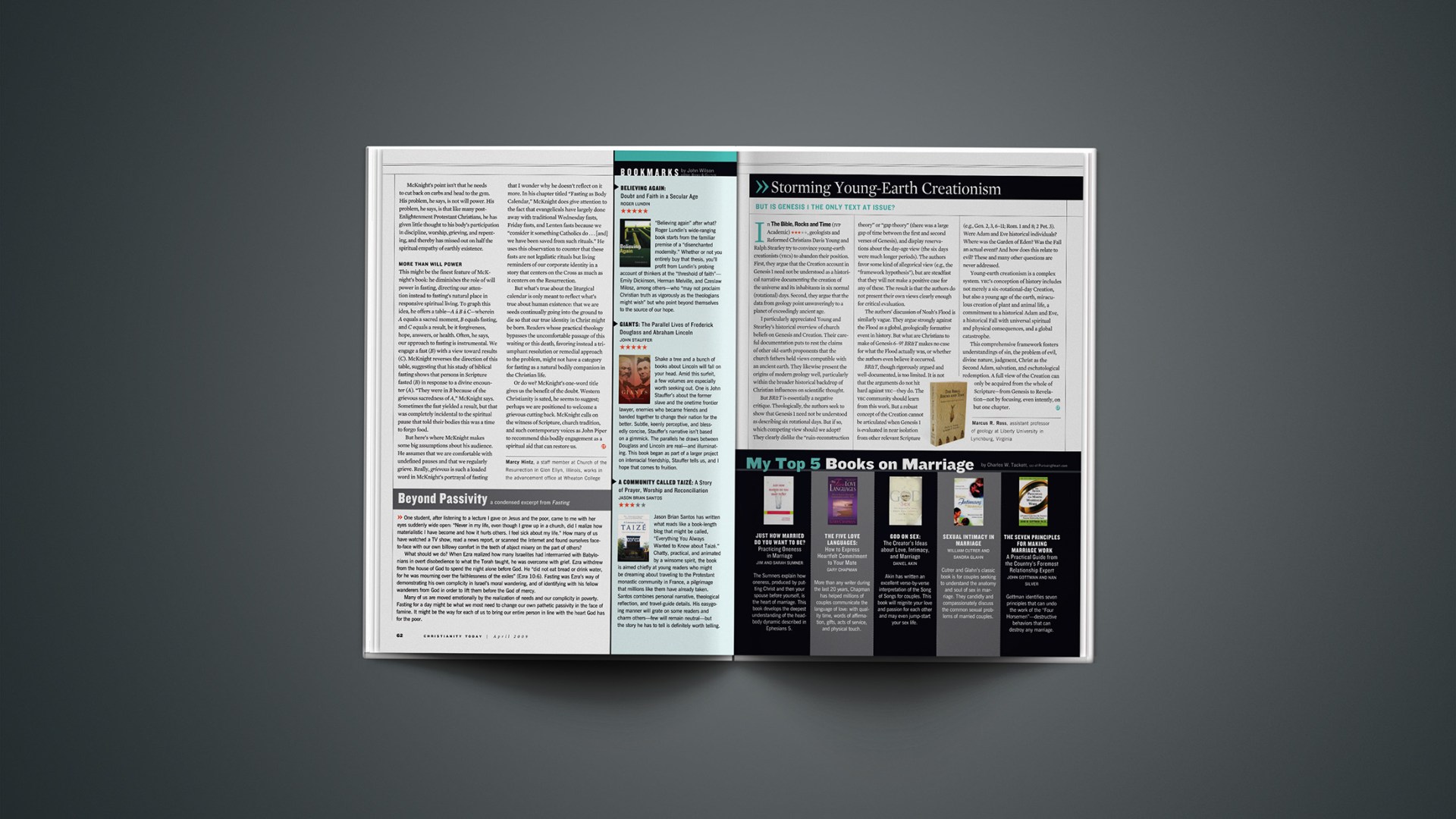 |
The Bible, Rocks and Time by Davis A. Young and Ralph F. Stearley IVP Academic, September 2008 510 pp., $21.99 |
In The Bible, Rocks and Time (IVP Academic), geologists and Reformed Christians Davis Young and Ralph Stearley try to convince young-earth creationists (YECs) to abandon their position. First, they argue that the Creation account in Genesis 1 need not be understood as a historical narrative documenting the creation of the universe and its inhabitants in six normal (rotational) days. Second, they argue that the data from geology point unwaveringly to a planet of exceedingly ancient age.
I particularly appreciated Young and Stearley’s historical overview of church beliefs on Genesis and Creation. Their careful documentation puts to rest the claims of other old-earth proponents that the church fathers held views compatible with an ancient earth. They likewise present the origins of modern geology well, particularly within the broader historical backdrop of Christian influences on scientific thought.
But BR&T is essentially a negative critique. Theologically, the authors seek to show that Genesis 1 need not be understood as describing six rotational days. But if so, which competing view should we adopt? They clearly dislike the “ruin-reconstruction theory” or “gap theory” (there was a large gap of time between the first and second verses of Genesis), and display reservations about the day-age view (the six days were much longer periods). The authors favor some kind of allegorical view (e.g., the “framework hypothesis”), but are steadfast that they will not make a positive case for any of these. The result is that the authors do not present their own views clearly enough for critical evaluation.
The authors’ discussion of Noah’s Flood is similarly vague. They argue strongly against the Flood as a global, geologically formative event in history. But what are Christians to make of Genesis 6-9? BR&T makes no case for what the Flood actually was, or whether the authors even believe it occurred.
BR&T, though rigorously argued and well-documented, is too limited. It is not that the arguments do not hit hard against YEC—they do. The YEC community should learn from this work. But a robust concept of the Creation cannot be articulated when Genesis 1 is evaluated in near isolation from other relevant Scripture (e.g., Gen. 2, 3, 6-11; Rom. 1 and 8; 2 Pet. 3). Were Adam and Eve historical individuals? Where was the Garden of Eden? Was the Fall an actual event? And how does this relate to evil? These and many other questions are never addressed.
Young-earth creationism is a complex system. YEC’s conception of history includes not merely a six-rotational-day Creation, but also a young age of the earth, miraculous creation of plant and animal life, a commitment to a historical Adam and Eve, a historical Fall with universal spiritual and physical consequences, and a global catastrophe.
This comprehensive framework fosters understandings of sin, the problem of evil, divine nature, judgment, Christ as the Second Adam, salvation, and eschatological redemption. A full view of the Creation can only be acquired from the whole of Scripture—from Genesis to Revelation—not by focusing, even intently, on but one chapter.
Marcus R. Ross, assistant professor of geology at Liberty University in Lynchburg, Virginia
Copyright © 2009 Christianity Today. Click for reprint information.
Related Elsewhere:
The Bible, Rocks and Time is available at ChristianBook.com and other book retailers.
Christianity Today has more book reviews.
Other articles on origins include:
At Origins’ Margins | Michael Behe wonders how much Darwinism can really explain. (March 27, 2008)
Living with the Darwin Fish | Why the discovery of yet another ‘missing link’ doesn’t destroy my faith. (March 12, 2007)
The Art of Debating Darwin | How to intelligently design a winning case for God’s role in creation. (September 1, 2004)
Intelligent Design: Searching for a Blueprint | Discovery Institute reshapes the orgins debate. (November 15, 1999)










